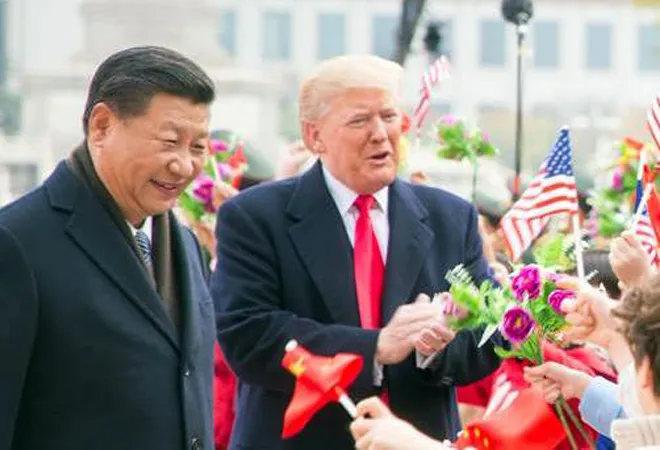2018 could be a portentous year for China. Its principal relationship – that with the United States – is on a cusp. Things could get better, but more likely they will get worse. The Trump administration’s retreat from the world has just enlarged China’s strategic opportunity. Such circumstances are not the most propitious for international relations.
1. Internally, the trend of the Communist Party of China (CPC) reasserting its control over the state and society is likely to intensify. As Xi Jinping told the 19th Party Congress: “Government, military, society and schools, north, south, east, west, the Party is the leader of everything.” Private businesses, educational and other institutions are being told that the Party head of that institution must also be inducted into the governing board of that entity.
2. Xi is very much in-charge of the Party and the state and has consolidated his hold as the most powerful leader China has seen since Deng Xiaoping. Indeed, the very first meeting of the Politburo after the Congress decided that the CPC needed to “safeguard Xi’s position at the core of the CPC Central Committee and the whole Party.”
He is also holding the military close to himself, among the most important meetings he held following the Party Congress were with the military. On the occasion of new year, Xi again donned a military uniform and conducted what Xinhua said was a fist ever “mobilisation meeting” where Xi issued instructions to the People’s Liberation Army (PLA) to strengthen “ real combat training an improve its war willing capability.” Though the parade involved one crack division of the PLA ground force, it was witnessed over close circuit TV by PLA formations in 4,000 different locations.
Another new development has been the decision to resume the old practice of having PLA personnel in the Party Standing Committees which deal with every aspect of administration in China.
3. It will be interesting to watch how these trends impact on the economic development of China. The signal came in the Party Congress when it changed the principal contradiction, geared to boosting the material life of the people, to one which focused on removing imbalances and improving their quality of life. The Chinese leadership need to deal with four major issues – dealing with the massive debt overhang which could undermine economic stability, eliminating the vestiges of poverty which could destabilise society, reducing pollution which affects the life of all those who live in China, and coping with the American demands on trade and North Korea.
4. The last named has the potential of degenerating into a military conflict and has serious implications for China and the North-east Asian region. The US may not be directly affected, but any military action will result in a downward spiral of the global economy and, if anything, tip the regional balance in favour of China. Deneuclarisation of North Korea is not likely to happen. Sanctions alone will not work, just as they have not in the case of India or Pakistan.
5. The new US National Security Strategy (NSS) has clearly shifted tracks of the US policy. The NSS says that the US had worked on the assumption that integration of China into the international system it had created after World War II was its norm, now the Trump team believed that America has been led up the garden path and China wants to integrate on its own terms, accepting the benefits and avoiding the obligations. For a long time Trump had been claiming that the US is being taken for a ride by China and we may now be at the cusp of a major change in US–China relations as the Americans being to implement punitive trade measures against Beijing.
6. The post-Tiananmen CPC was led largely by engineers and technocrats who had become politicians like Jiang Zemin, Hu Jintao, Li Peng, Zhu Rongji and Wen Jiabao. However, now professional politicians are at the helm – Xi Jinping and Li Keqiang. The former did study engineering, but has never worked as an engineer, the latter followed the route of many Indian politicians, he studied law.
The point is that in the main they all have a technotronic orientation and so it is not surprising that they are taking uncommon interest in promoting Big Data, Artificial Intelligence and Robotics very seriously. Their aim is to have all the AI revolution under the command of the CPC. China has huge data sets and few privacy controls, further, this data is being used for maintaining social control in a society that is already under authoritarian rule.
7. Ever since Xi has taken over, China has been more assertively pushing its foreign goals. China is already a major economic power across the globe. It now wants its military also to catch up with the kind of economic clout it has. China is inexperienced and somewhat gauche in the exercise of global power. But it is being helped along by the US retreat from its global responsibilities.
Under Xi, China has launched a massive programme of infrastructure and connectivity development involving hundreds of billions of dollars. This could be a make or break project which could see China waste a lot of money, or transform its economy. In 2018 China’s influence will continue to expand across South, South-east and Central Asia. Now, as the US retreats, China is the principal beneficiary.
This commentary originally appeared in The Wire.
The views expressed above belong to the author(s). ORF research and analyses now available on Telegram! Click here to access our curated content — blogs, longforms and interviews.




 PREV
PREV


